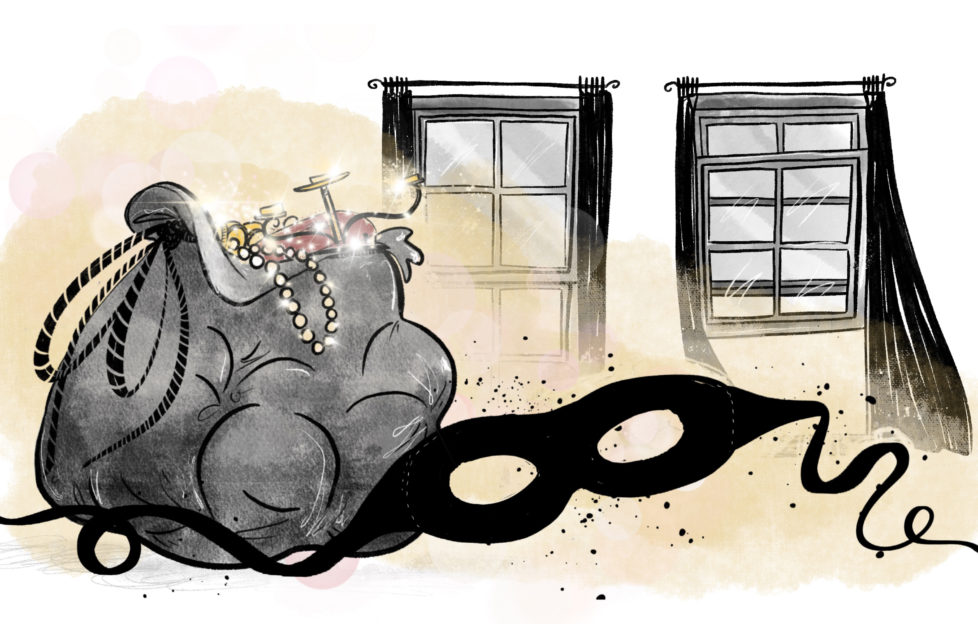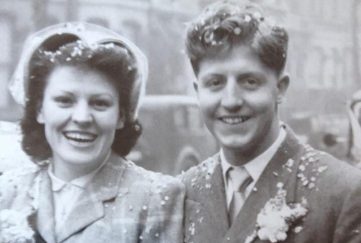“Fellow Craftsmen” By C. Reginald Poole

This story was subtitled “A Midnight Escapade”, and was first published in “The People’s Friend” in March 1912.
It shows that the “Friend” of the past wasn’t frightened to find humour in stranger places . . . we hope you enjoy!
When Mr Job Preece decided to investigate the interior of No. 5 Westleigh Mansions with a view to abstracting such portable valuables as he should find on the premises, he was influenced chiefly by the fact that the house was temporarily “shut up” during the absence of the owner and his family.
For Job was by nature timid, and he had no intention of risking an encounter with an irate housekeeper.
What induced a man like him to embark upon the hazardous adventure of burglary was a mystery to his friends, and at times a matter of imperfect comprehension to Job himself.
To say that he was unskilful in his operations would be to put the case mildly. He was born to crack cribs where no “swag” was, and either to get “lagged” in the act, or to leave some incriminating article behind.
As for fingerprints, poor Job never thought about them until after he had scattered a profusion of clear impressions all over the premises.
Having effected an entry through the scullery window at No. 5, it was characteristic of Job that he should omit to close it behind him. He was fated to forget things like that.
When Billy Wrinch, well-groomed and spruce, arrived on the scene ten minutes later, the sight of the open window pulled him up with a jerk.
“Too late, by gum!” ejaculated Billy. “Somebody’s been here before me.”
A moment’s reflection, however, made him modify his hasty supposition. To a clever cracksman like Billy it was inconceivable that any member of the “profession” could be guilty of so glaring a blunder.
“Copper nosing round inside, perhaps,” meditated Billy. “Doesn’t sound very likely, though. No, a copper would ring the front door bell if he suspected there was anything wrong.
“Most probably the bloomin’ caretaker forgot to shut it.”
For Billy knew, what Job did not, that an elderly caretaker and his wife were sleeping somewhere on the premises.
As a rule, Billy didn’t trouble about caretakers. In his experience they were people who slept soundly in remote parts of the house, and who, if by chance they should awaken and hear unusual sounds, were more likely to bury their heads, ostrich-like, under the bedclothes than to get up and investigate.
But this open window was another matter, and made him pause.
Billy, however, was not the sort of man to turn back from an enterprise once undertaken. He knew that, while her Ladyship’s jewels were all at the bank, a goodly quantity of Sir Anthony’s fine old plate was still in the house, and he wasn’t going to let such an opportunity slip because of a little risk.
Beside Billy knew he could trust himself to cope with most emergencies.
He climbed cautiously in, closed the window, and drew tight-fitting felt slippers over his patent leather shoes. Stealthily he crept through the kitchen quarters into the hall, where he paused to listen. His quick ear at once detected a faint rasping sounds coming from a room close by.
He turned the handle of the door softly, and peeped in. What he saw brought a grin to his face. Job was on his knees before a heavy cabinet, the lock of which he was trying to pick; and something clumsy and amateurish in his methods at once betrayed the novice to Billy’s experienced eye.
He was about to step forward with a whispered, “Halves, partner!” that there should be no gainsaying, when a bold idea occurred to him.
Bounce was, perhaps, Billy’s strongest point! He would bounce this poor incompetent into giving up the lot.
He crept forward softly, and tapped the kneeling figure smartly on the shoulder.
“Now, then,” he said in low, sharp tones, “what the devil are you doing here?”
Job started, dropped his tools, and glanced up; and the well-groomed Billy, who for strategic reasons always “worked” in evening dress, and wore gloves, was satisfied with the impression he made.
“Caught you fairly, my lad!” he said grimly.
“Let us orf, guv’nor,” pleaded Job huskily. “I was druv to this, I was. I’m a honest, respectable workin’ man out of a job, I am. And I’ve a wife and six kids starvin’ at ‘ome—”
“Oh, chuck it!” said Billy elegantly. “You make me tired.”
He perched himself on the table, swinging his legs, and regarded the unhappy Job with supreme professional contempt.
“You’re a pretty sort of beauty for a burglar, ain’t you?” he said witheringly. “Leaving a window open like that! Why don’t you try pinching kids’ chocolate money instead, eh? That’s more in your line, I reckon.”
“It’s the fust time, guv’nor—” began Job.
“Oh, don’t talk to me,” said Billy impatiently. “Jolly lucky I happened to drop in when I did. I came back to town unexpectedly, and thought I’d try forcing my way in at the back instead of ringing up the caretaker.
“Very kind of you to save me the trouble, I must say. Now, let’s see if you’ve taken anything.”
He took up Job’s lantern and flashed it round the room, his eye resting with approval on several heavy silver vases that promised well for a more extended search.
It did not then or later strike Job as curious that he did not switch on the electric light with which the room was fitted. But then, Job was never noted for intelligence.
“Let us orf, guv’nor,” he whined. “I’ve never done it afore. But I was druv to it. We ain’t ‘ad a bit o’ food in the ‘ouse for three days, and—”
“Oh, shut up!” said Billy testily. “I don’t want to hear your interestin’ family history. If you’re as rotten a liar as you are a burglar it won’t be worth hearing.
“You can thank your lucky stars I ain’t a revengeful sort of cove. I reckon it ‘ud be a waste of time to put a worm like you away.
“You’re bound to get ‘lagged’ soon enough in all conscience. So you can skip! D’ye hear?”
“Wot, guv’nor! D’ye mean I can go?” queried the astonished Job.
Billy nodded.
“Skip! Bunk! Quit! Go home and bury yourself. I’ll just see you off the premises, and then—”
He stopped abruptly and glanced over his shoulder with a startled expression on his face. His quick ear had caught the sound of a stealthy footfall in the hall.
Here’s a little bonus — a video of Illustrations Editor Manon creating the fantastic design for this story!
Before he could move the door was flung open, he heard the click of a switch, and the room was suddenly flooded with light.
In the doorway regarding them stood an old, white-haired man in dressing gown and slippers. Behind him, peeping over his shoulder, was a weird figure also in night attire, with wisps of grey hair straggling from under an old-fashioned night cap.
The old man had a revolver in his hand and was pointing it at the intruders with an air of determination that made them feel decidedly uncomfortable.
“Hands up!” he said briefly.
Billy and Job decided that it was no time for argument; their hands went up mechanically.
“Move, or attempt any trickery,” said the old man in level controlled tones that betrayed not the slightest symptom of hesitation or excitement, “and I shall shoot.
“I’m a dead shot, too. Bear that in mind.
“Don’t be alarmed, my love,” he added in a different voice.
“Alarmed!” came scornfully in high-pitched tones from the figure behind him. “Nonsense, Nathaniel! it’s these villains who ought to feel alarmed, not me. Keep an eye on them while I telephone for the police.”
She moved away. Next moment there was a faint whispering sound in the hall and a number was given.
“Yes? Is that Vaughan Street police station? This is Number Five, Westleigh Mansions. Two burglars—what? Yes. Burglars, I said! Yes. Two of ’em. What? No—No—Yes—Thank you.”
As the “ring-off” tinkled in his ears, Billy reflected disconsolately that his notions regarding caretakers would require revision.
Evidently there were caretakers and caretakers. He swore softly to himself, pausing every now and then to glance with a fierce contempt at the cringing Job, who, having at last grasped the significance of Billy’s sudden change of role from householder to housebreaker, was whining out vain appeals to the inexorable old man in the doorway.
At length heavy footsteps were heard crunching the gravel outside. The old woman hastened to the front door and unlocked and unbarred it. There was a low-voiced colloquy in the hall. Then a police sergeant and a constable entered the room.
“What! Billy Wrinch!” said the sergeant genially. “Well met again, Billy! And who’s the other one? I seem to know his face. Pal of yours?”
Billy shook his head.
“Bloomin’ worm I found on the premises,” he said gloomily. “Amateur, I reckon.”
He held out his hands mechanically, as the officer produced a pair of handcuffs and dextrously slipped them on, the constable performing a similar office for Job.
“Anything gone?” asked the sergeant, glancing round the room.
“I think not,” said the old man. “I fancy I intercepted them just in time.”
“Well, I’ll have them both thoroughly searched at the station. Sir Anthony ought to be very pleased with you when he hears about it.”
The old man chuckled grimly.
“Sir Anthony will be highly displeased with me. You see, he’s a trifle old-fashioned in his notions, and the trouble I had to get him to install that telephone you wouldn’t believe.
“He’s always said the thing was more bother that it’s worth. I fancy he’ll have to admit that he was wrong. I fancy Sir Anthony would rather lose his property than do that.”
“Useful contrivance, the telephone,” said the officer formally. He took out a black-covered notebook, asked a few questions, and carefully entered the replies.
Then he closed the book with a snap and returned it to his pocket.
“And Sir Anthony—?” he said.
“I will write to him first thing in the morning.”
“Then I need trouble you no more at present. Good-night.”
“Good-night.”
The prisoners were led away
***
A few minutes later a motor-car glided noiselessly up to the back door of Number Five.
Down the garden path scurried the two figures in dressing gowns, each carrying a heavy bag. Without word to the driver they got in, and the car immediately started off at a fast pace.
Inside, the shorter of the two leaned back on the cushions with a sigh of content, and stretching out “her” legs to the seat opposite revealed the ends of an unmistakeable pair of trousers peeping from underneath “her” nightgown.
“Now then, Sammy,” said the other sharply, as he whipped off his dressing gown. “Take those things off. And chuck me that wet sponge. Look alive!”
Sammy obeyed, and, having doffed his night attire, revealed himself as a short, plump young man, neatly dressed in blue serge.
He looked at the other and grinned.
“Rippin’ idea of yours to impersonate caretakers, Jimmy,” he said admiringly. “You have got a neck, old man.”
The other chuckled complacently.
“When in a tight place,” he observed, as he dextrously removed his whiskers, ” the bold method is invariably the best.
“It was an awkward situation for you and me when those two ‘lags’ turned up when we were finishing our make-up upstairs, but we can flatter ourselves we managed to cop with it pretty effectively.
“Cultivate nerve, Sammy; in our trade it’s worth all the other virtues put together.”
“Lucky thing Billy Wrinch didn’t ‘spot’ us,” said Sammy. “I owed him one over that Masterson affair last year, but I reckon I can look upon that account as settled.
“What I should like now would be to see the faces of those two coppers when they find out they’ve been had.”
They chuckled exuberantly at the idea.
“By the way,” said the little man after a pause, thoughtfully. “I wonder if there was a caretaker in the bloomin’ house, Jimmy?”
Click here to read more of our fantastic Fiction content.
Click here to delve into our dramatic Daily Serial.





